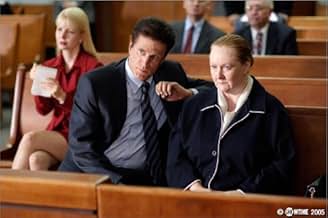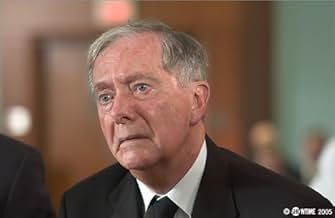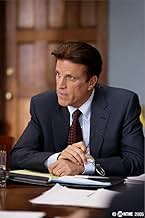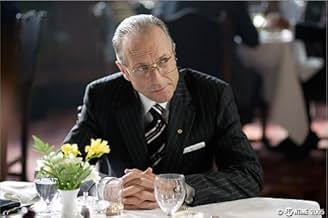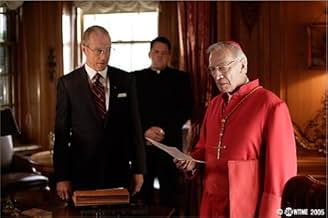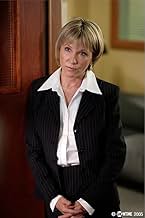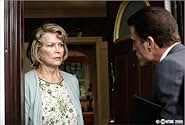Ajouter une intrigue dans votre langueA dramatized account of the hidden sexual abuse and scandal that shook the foundation of the Catholic Church, and the characters, events, and policies that brought the abuse and scandal into... Tout lireA dramatized account of the hidden sexual abuse and scandal that shook the foundation of the Catholic Church, and the characters, events, and policies that brought the abuse and scandal into existence.A dramatized account of the hidden sexual abuse and scandal that shook the foundation of the Catholic Church, and the characters, events, and policies that brought the abuse and scandal into existence.
- Director
- Writers
- Stars
- Nommé pour 2 prix Primetime Emmy
- 8 nominations au total
James Aaron Oliver
- Patrick McSorley
- (as James Oliver)
Avis en vedette
10jotix100
Showtime ought to be congratulated for its courage in bringing "Our Fathers" to the television screen as a film. Dan Curtis, the director, gives us a first rate account about this sad chapter of abuse to young children by Catholic priests. Those same priests were supposed to have been examples and role models for young children, but in violating that trust, these men committed crimes one never suspected them capable of doing. The book by David France, "Our Fathers: The Secret Life of the Catholic Church in an Age of Scandal", gets an amazing screen treatment by Thomas Michael Donnelly.
The books emphasizes the role of Cardinal Bernard Law in the whole affair. This sinister figure, who was able to get away with murder by resigning his post as the head of the Boston Diocese, is still not admitting his role in the cover up, even after everything is well known and documented.
Father John Geoghan, the monster priest arrested and convicted of several sexual molestation charges, is one of the most repugnant figures involved in the scandal. We watch as this man is ordained with tears in his eyes in the early 60s. Father John is seen as a holy man who is quite charming hiding behind a facade of being good to the children. Parents love him because what they see a role model for their boys to follow.
The film concentrates on Angelo DiFranco's story. Angelo is seen putting his own fist through a mirror in rage. This young man and his lawyer, Mitchell Garabedian, are instrumental into putting the lawyer in contact with Mary Ryan, a woman whose seven boys are sexually abused by father Geoghan. Mrs. Ryan is asked to keep quiet.
The other priest in the story, Father Joseph Birmingham, is also responsible for abuses to other children. Another accuser, Olan Horne, brings it to the attention of Cardinal Law, who is arrogant and indignant about the accusations. Cardinal Law makes a point to tell Olan that Christ hasn't done anything wrong, if anything, he was the one instrumental in his failure as the man who could have solved the problem, but didn't. In the end we watch Cardinal Bernard Law with tears in his eyes as he resigns. Unfortunately, much too late!
The performances are first rate. Christopher Plummer as the sinister cardinal does an excellent performance. Chris Bauer and Daniel Baldwin, two talented young actors, are seen as Olan Horne and Angelo DiFranco, respectively. Ted Danson, as the lawyer is not as effective, maybe because we don't see him as Mr. Garabedian at all. Brian Dennehy is good as Father Spagnolia. Ellen Burstyn is a great Mary Ryan, full of rage and bitter for what the evil priest did to her sons. Steve Shaw plays the evil Father Geoghan.
The tragedy that was done to innocent children by these heartless men will stay in the victim's memories forever. More than likely, these monster priests were abused themselves as children, and now they feel it's their turn to keep the practice going.
The books emphasizes the role of Cardinal Bernard Law in the whole affair. This sinister figure, who was able to get away with murder by resigning his post as the head of the Boston Diocese, is still not admitting his role in the cover up, even after everything is well known and documented.
Father John Geoghan, the monster priest arrested and convicted of several sexual molestation charges, is one of the most repugnant figures involved in the scandal. We watch as this man is ordained with tears in his eyes in the early 60s. Father John is seen as a holy man who is quite charming hiding behind a facade of being good to the children. Parents love him because what they see a role model for their boys to follow.
The film concentrates on Angelo DiFranco's story. Angelo is seen putting his own fist through a mirror in rage. This young man and his lawyer, Mitchell Garabedian, are instrumental into putting the lawyer in contact with Mary Ryan, a woman whose seven boys are sexually abused by father Geoghan. Mrs. Ryan is asked to keep quiet.
The other priest in the story, Father Joseph Birmingham, is also responsible for abuses to other children. Another accuser, Olan Horne, brings it to the attention of Cardinal Law, who is arrogant and indignant about the accusations. Cardinal Law makes a point to tell Olan that Christ hasn't done anything wrong, if anything, he was the one instrumental in his failure as the man who could have solved the problem, but didn't. In the end we watch Cardinal Bernard Law with tears in his eyes as he resigns. Unfortunately, much too late!
The performances are first rate. Christopher Plummer as the sinister cardinal does an excellent performance. Chris Bauer and Daniel Baldwin, two talented young actors, are seen as Olan Horne and Angelo DiFranco, respectively. Ted Danson, as the lawyer is not as effective, maybe because we don't see him as Mr. Garabedian at all. Brian Dennehy is good as Father Spagnolia. Ellen Burstyn is a great Mary Ryan, full of rage and bitter for what the evil priest did to her sons. Steve Shaw plays the evil Father Geoghan.
The tragedy that was done to innocent children by these heartless men will stay in the victim's memories forever. More than likely, these monster priests were abused themselves as children, and now they feel it's their turn to keep the practice going.
"Our Fathers", which is based on the book by David France, deserves an epic-size treatment of the sexual abuse of children by some clergy members within the Boston Archdiocese and the politics within the Catholic Church on this matter.
The movie is not as powerful as it could have been. That is not to say screenwriter Thomas Michael Donnelly and veteran director Dan Curtis (Dark Shadows, The Winds of War, War and Remembrance) totally failed. The scenes of abuse were handled with great sensitivity, they were not gratuitous or exploitive.
There are some very heartbreaking moments which include Ellen Burstyn as the mother of seven children who were all abused by one priest. Burstyn only appears in the film for only a few minutes but she makes the most of her scenes. (Update: If the group that awards the Emmys wanted to nominate a short but powerful performance by Burstyn, it should have been this one not the 14 second performance in Mrs. Harris. But I digress.)
Also of note, Chris Bauer who plays Olan Horne, one of the victims. He has a scene in which he is taunted by a couple of insensitive men at a local deli. When he graphically describes to them how he was abused, I was almost in tears. Bauer was a standout.
Christopher Plummer does a good job playing Cardinal Bernard Law. It would have been very easy to play him as a caricature (which, in my opinion, is what happened with the actors who portrayed the young and adult Fr. Geoghan) and Plummer somehow gave him some sympathetic qualities which made him a bit more complex.
My main issue with the movie was the decision by the screenwriter and the director to put so much weight on the legal aspects of the case and the news media's part of reporting the story. It does not mean that those aspects of the story should be ignored. Perhaps it had more to do with the source material. Author David France covered the crisis when he was a senior editor at Newsweek.
Because of this, despite some good scenes, I thought Ted Danson performance as Mitchell Garabedian was problematic. I was unable to connect with his character because I was paying more attention to the victims and the clergy. To me, Garabedian is a secondary character who was placed in a lead role. Also, I was very unimpressed with the scenes involving the reporters at the Boston Globe. It felt like a poor imitation of "All The President's Men".
There should have been more stories about the adult victims and their families and how these abuses affected their lives. I wished they would have delved more into the politics of the Catholic Church and why the church failed the victims and the reactions of parishioners and how their faith was shaken by this controversy.
I also believe that if the movie was performed chronologically and not used flashbacks, it would have been even more powerful and effective. While watching "Our Fathers", I kept thinking about the landmark, two-part film "The Boys of St. Vincent" (1992 and 1993), which told the true story of the sexual abuse of children at a orphanage in Newfoundland, Canada. The orphanage was run by a religious community. The movies also showed how it affected the victims, their families and the abusers 15 years later.
Also, I found Brian Dennehy's performance as Father Dominic Spagnolia, the clergyman who publicly criticized Cardinal Law and the Boston Archdiocese's handling of the sexual abuse claims but also had skeletons in his own closet, fiercely charismatic and totally fearless. Dennehy has been one of my favorite actors and when he sinks his teeth into a role, watch out. However, I believe the story of Father Spagnolia deserves a movie of its own.
Overall, "Our Fathers" was well-intended but not totally successful.
The movie is not as powerful as it could have been. That is not to say screenwriter Thomas Michael Donnelly and veteran director Dan Curtis (Dark Shadows, The Winds of War, War and Remembrance) totally failed. The scenes of abuse were handled with great sensitivity, they were not gratuitous or exploitive.
There are some very heartbreaking moments which include Ellen Burstyn as the mother of seven children who were all abused by one priest. Burstyn only appears in the film for only a few minutes but she makes the most of her scenes. (Update: If the group that awards the Emmys wanted to nominate a short but powerful performance by Burstyn, it should have been this one not the 14 second performance in Mrs. Harris. But I digress.)
Also of note, Chris Bauer who plays Olan Horne, one of the victims. He has a scene in which he is taunted by a couple of insensitive men at a local deli. When he graphically describes to them how he was abused, I was almost in tears. Bauer was a standout.
Christopher Plummer does a good job playing Cardinal Bernard Law. It would have been very easy to play him as a caricature (which, in my opinion, is what happened with the actors who portrayed the young and adult Fr. Geoghan) and Plummer somehow gave him some sympathetic qualities which made him a bit more complex.
My main issue with the movie was the decision by the screenwriter and the director to put so much weight on the legal aspects of the case and the news media's part of reporting the story. It does not mean that those aspects of the story should be ignored. Perhaps it had more to do with the source material. Author David France covered the crisis when he was a senior editor at Newsweek.
Because of this, despite some good scenes, I thought Ted Danson performance as Mitchell Garabedian was problematic. I was unable to connect with his character because I was paying more attention to the victims and the clergy. To me, Garabedian is a secondary character who was placed in a lead role. Also, I was very unimpressed with the scenes involving the reporters at the Boston Globe. It felt like a poor imitation of "All The President's Men".
There should have been more stories about the adult victims and their families and how these abuses affected their lives. I wished they would have delved more into the politics of the Catholic Church and why the church failed the victims and the reactions of parishioners and how their faith was shaken by this controversy.
I also believe that if the movie was performed chronologically and not used flashbacks, it would have been even more powerful and effective. While watching "Our Fathers", I kept thinking about the landmark, two-part film "The Boys of St. Vincent" (1992 and 1993), which told the true story of the sexual abuse of children at a orphanage in Newfoundland, Canada. The orphanage was run by a religious community. The movies also showed how it affected the victims, their families and the abusers 15 years later.
Also, I found Brian Dennehy's performance as Father Dominic Spagnolia, the clergyman who publicly criticized Cardinal Law and the Boston Archdiocese's handling of the sexual abuse claims but also had skeletons in his own closet, fiercely charismatic and totally fearless. Dennehy has been one of my favorite actors and when he sinks his teeth into a role, watch out. However, I believe the story of Father Spagnolia deserves a movie of its own.
Overall, "Our Fathers" was well-intended but not totally successful.
Much credit should go to David France and Thomas Michael Donnelly for the book and screenplay for "Our Fathers." The delicate subject matter of pedophilia in the Catholic church and the years of cover-up of the abuses in the hierarchy of the Boston diocese were handled with great sensitivity.
Every note of the film rang true, which was due in large part to the stellar cast. Christopher Plummer as Cardinal Law and Brian Dennehy as Father Spagnolia were both standouts. But the smaller roles were noteworthy as well, especially the adult men who were the abuse victims. The long-term effects of the abuse were vividly conveyed by those actors, who played their roles with great feeling and conviction. Ted Danson was very effective as an attorney motivated by the pursuit of justice, as opposed to greed. Even the actor who was faced with the daunting task of playing the late Pope John Paul II was highly credible. This brilliant ensemble was led skillfully under the sensitive direction of Dan Curtis.
This could have been a run-of-the-mill, lurid made-for-television film. Instead, it was an enterprise created with integrity by all of the artists involved.
Every note of the film rang true, which was due in large part to the stellar cast. Christopher Plummer as Cardinal Law and Brian Dennehy as Father Spagnolia were both standouts. But the smaller roles were noteworthy as well, especially the adult men who were the abuse victims. The long-term effects of the abuse were vividly conveyed by those actors, who played their roles with great feeling and conviction. Ted Danson was very effective as an attorney motivated by the pursuit of justice, as opposed to greed. Even the actor who was faced with the daunting task of playing the late Pope John Paul II was highly credible. This brilliant ensemble was led skillfully under the sensitive direction of Dan Curtis.
This could have been a run-of-the-mill, lurid made-for-television film. Instead, it was an enterprise created with integrity by all of the artists involved.
Our Fathers should have been titled more accurately as The Sins Of Our Fathers. I found this film to be a big let-down. Honesty would have given a more profound look into the lives that were destroyed, as well as the devastated families of those children that were molested and/or brutally raped. Many of these victims remained silent for decades, riddled with guilt and shame ... knowing that they would not be believed if they told the truth about these stereo-typical God-like figures that have always been held in such high regard for their holiness. Most of those that did tell ... they were thrown to the wolves, never to darken their families doorstep again. Many turned to drugs ... to escape the mental torments ... many died during those desperate escapes from reality. Many turned to suicide ... while others turned to everything but God! How could one turn to a being that would allow such evil to occur within a church ... for thousands of years?! The worse of it is that these "Men of God" preyed upon the weakest of our children ... the already abused ... the emotionally disturbed ... the disabled. They also preyed upon those same children that came to them for help ... because they were being horribly abused by another! Because that is what we were taught ... if you are in trouble ... seek out a policeman, better yet ..... a Priest! OMG ... we were so stupid! Give us a more true to life movie about this subject! Show us how these Men Of God bragged about their conquests ... and offered them to other Priests as well. The public deserves to know the whole truth! not just the tamer versions.
Our Fathers is a terrific movie made by Showtime depicting the Boston scandal involving pedophile priests and their effects on the children they abused so many years ago.
With an outstanding cast, the film brilliantly shows the impact on the lives of those abused and focuses on the church, in not the best of terms.
An all-star cast is headed by Ted Danson portraying the lawyer for the abused. Christopher Plummer, as Cardinal Bernard Law, and Brian Dennehy, as an accused priest-abuser turn in masterful Emmy nominated performances in supporting roles. They are just terrific but will probably cancel one another out on the Aug. 27th awards show.
Ellen Burstyn, who is at her best when she is miserable, appears in one scene as the mother of several of the victims.
The film goes all out in showing the culpability of higher ups in a major cover-up of the priest-abuse scandal. We probably haven't seen such an cover-up since Watergate.
Danson appears in the opening scene and acts as he did but in a non-comical way as TV's Becker.
The language is salty and surprising given the nature of the Catholic church. Four letter words are prevalent and unfortunately appropriate as the story goes on.
Plummer is just fabulous as Law, a guilt-ridden priest who is ready to sacrifice anyone to save his own neck. Equally good is Dennehy, who seems to be able to beat an abuse charge until his homosexuality is revealed.
Sin was never better than this.
With an outstanding cast, the film brilliantly shows the impact on the lives of those abused and focuses on the church, in not the best of terms.
An all-star cast is headed by Ted Danson portraying the lawyer for the abused. Christopher Plummer, as Cardinal Bernard Law, and Brian Dennehy, as an accused priest-abuser turn in masterful Emmy nominated performances in supporting roles. They are just terrific but will probably cancel one another out on the Aug. 27th awards show.
Ellen Burstyn, who is at her best when she is miserable, appears in one scene as the mother of several of the victims.
The film goes all out in showing the culpability of higher ups in a major cover-up of the priest-abuse scandal. We probably haven't seen such an cover-up since Watergate.
Danson appears in the opening scene and acts as he did but in a non-comical way as TV's Becker.
The language is salty and surprising given the nature of the Catholic church. Four letter words are prevalent and unfortunately appropriate as the story goes on.
Plummer is just fabulous as Law, a guilt-ridden priest who is ready to sacrifice anyone to save his own neck. Equally good is Dennehy, who seems to be able to beat an abuse charge until his homosexuality is revealed.
Sin was never better than this.
Le saviez-vous
- AnecdotesNear the end of the film Cardinal Bernard Law, as played by Christopher Plummer watches the movie Becket (1964). Plummer had starred in the original London stage production of the play BECKET.
- Citations
Angelo DeFranco: Why did this happen to me?
- ConnexionsFeatured in The 57th Annual Primetime Emmy Awards (2005)
Meilleurs choix
Connectez-vous pour évaluer et surveiller les recommandations personnalisées
Détails
- Date de sortie
- Pays d’origine
- Site officiel
- Langue
- Aussi connu sous le nom de
- Our Fathers
- Lieux de tournage
- sociétés de production
- Consultez plus de crédits d'entreprise sur IMDbPro
Box-office
- Budget
- 14 340 000 $ (estimation)
- Durée2 heures 10 minutes
- Couleur
- Rapport de forme
- 1.78 : 1
Contribuer à cette page
Suggérer une modification ou ajouter du contenu manquant



